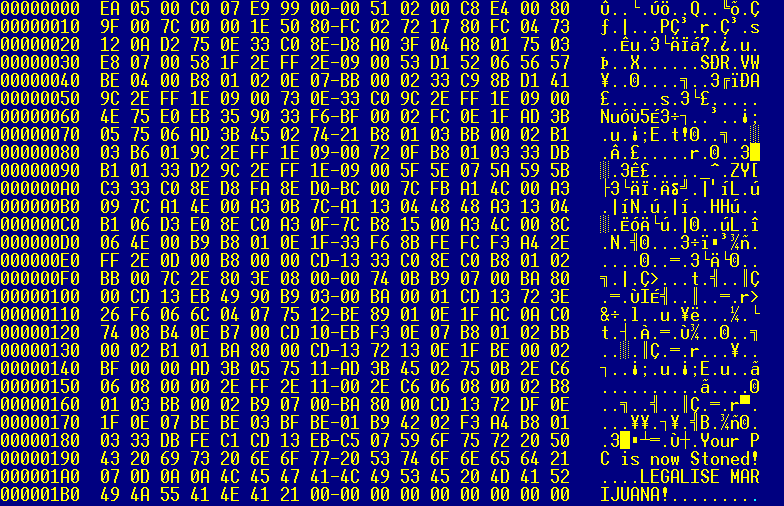This can be a section from the Provide Shock publication. To learn full editions, subscribe.
Bitcoin has its enemies.
Environmental alarmists, cussed central bankers and out-of-touch politicians would certainly rely, even when their ranks have thinned prior to now few years.
There’s additionally the odd boomer economist who would nonetheless leap on the probability to counsel that bitcoin has no intrinsic worth and embodies the larger idiot principle, if it meant further engagement.
All these archetypes are nice heels that routinely function sounding boards for Bitcoin discourse.
There are additionally those that’ve attacked Bitcoin out of boredom, curiosity or simply for enjoyable. Which I suppose is considerably cooler.
That is the story of 1 such punk hellbent on disrupting Bitcoin as finest they might.
On This Day — Bitcoin will get Stoned
This story begins all the way in which again in 1987, greater than 20 years earlier than Bitcoin.
It’s believed that an unknown scholar on the College of Wellington in New Zealand had developed malware often known as Stoned, one of many first ever laptop viruses.
Stoned was an early boot virus, a class which infects the boot sector of a tough drive or detachable media (principally floppy disks again then), altering how computer systems initially load their working methods and run different vital start-up features.
It was technically a novel virus, however in actuality, Stoned was extra of an elaborate prank.
An contaminated machine would have a one in eight probability of loading a display screen that will merely show a pro-pot message:
“Your PC is now stoned! LEGALIZE MARIJUANA!”

Test the underside proper nook — you’ve been Stoned!
Twenty-seven years later, on Might 15, 2014, a pseudonymous Home windows 7 person reported a worrying false optimistic from their Microsoft Safety Necessities bundle.
Microsoft’s built-in antivirus software program had detected Stoned’s virus signature in Bitcoin’s blockchain knowledge, resulting in fixed annoying popups and even deletion of all related recordsdata.
That included removing of the whole copy of the chain’s historical past required to sync nodes, which was virtually 19 GB giant on the time, knowledge that will be mechanically re-downloaded by the Bitcoin consumer.
It didn’t make any sense for Stoned to have actually contaminated Bitcoin Core. The virus’s code could be utterly benign, even when it have been by some means written to the chain in its entirety.
The working principle was that maybe by some statistical anomaly, Bitcoin’s hash operate for its block headers had by some means generated sufficient of Stone’s hexadecimal byte sequences for Microsoft’s malware scanner to recognise it because the precise virus.
Microsoft then rapidly patched Safety Necessities to disregard the curiosity.
The smoking gun solely happened six weeks later, by means of IT skilled Didier Stevens. It was not a hoax: Somebody had deliberately tried to deliver down Bitcoin nodes.
Stevens had found a sequence of transactions from April 4, 2014 that includes outputs containing an identical byte sequences to ones inside Stoned’s code.
In the meantime, two days earlier, a Pastebin submit by an nameless creator had outlined a way of spamming the Bitcoin particularly to set off false-positives from antivirus software program.
They wrote: “Spamming the bitcoin database with virus signatures will trigger havoc. Some antivirus-programs will delete the database domestically, others will deny their bitcoin-client entry to the databases.”
“Some received’t be capable of begin their bitcoin-clients once more (and might’t perceive why). Some will format and reinstall their laptop…to as soon as once more get ‘contaminated’ after they get a bitcoin consumer once more.”
Subsequent, panic would strike “laptop n00bs” alongside rumors that Bitcoin is spreading viruses. Then, chaos, with the media dramatizing the state of affairs.
“The worth of bitcoins will drop hasty…Please assist spamming the bitcoin database with virus signatures :)”

Stoned bytecode was injected into Bitcoin’s chain knowledge inside a few day of the submit.
In fact, there was no widespread panic. The worth of bitcoin by no means crashed in relation to the prank, and there wasn’t a noticeable drop in hash price due nodes being knocked offline.
However there have been discussion board threads about it, in addition to media headlines, blogs and different posts, together with this one, 11 years later. That’s gotta rely for one thing.
— David
From The Pod
Today, Bitcoin is more and more divided over whether or not spam, not not like the Stoned bytecode, is, actually, a virus.
“We’ve all the time been hostile to the shitcoiners after they invade. Make no mistake, they’re invading proper now and we must be hostile to them once more.”
These are the passionate phrases of Chris Guida, a Bitcoin ecosystem developer in favor of stopping non-standard knowledge from ever making it to the chain through the ever-polarizing OP_RETURN subject.








